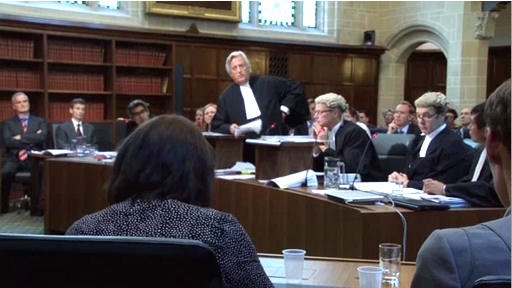
Executive and non-executive officers of companies and their advisors need to be aware of the proposed crime of Ecocide. On the 30th September and only for one day Ecocide, the International 5th Crime Against humanity came into being. It was enacted in the UK by the fictitious Ecocide Act 2010 and the CEO’s of two oil companies were put on the dock in the Supreme Court for causing destruction of the environment.
The trial was not real but Michael Mansfield QC for the prosecution and Christopher R Parker QC for the defence, and their respective legal teams, were real enough. Mr Mansfield with his larger than life persona and shock of white hair; Mr Parker with his menacing low piercing tone. The crime was based on two very real scenarios, the major oil spill in the Gulf of Mexico and the tar sand extraction in Canada. The CEOs in the dock were actors but the court was real, as was the tense and electric atmosphere throughout.
One could not resist Michael Mansfield’s argument that the principles of crimes against humanity – such as genocide – need to be applied to the environment. That the irrevocable harm caused to land and sea by the spilling of 250 million gallons of oil and the killing of over 2,000 birds as a by-product of tar sands extraction could not go unpunished. Those individuals, leaders of companies, had to take individual responsibility for their actions.
Christopher R Parker for the defence was unrelenting. The operations lead by the CEOs on the dock were regulated by Government, “permitted” and therefore nor the CEOs nor the companies that they work for had broken any laws. The clean up was also regulated and the chemicals used had been approved by the Government. Birds die all the time, in fact he estimated that 100 million birds were eaten by cats in the US last year. I see. I wondered whether our learned friend was implying that humans had the same brain capacity as cats.
The jury acquitted on the oil spill and convicted on the tar sands. I think the reasons for this may have been two fold. By the time Christopher R Parker was closing the oil spill in the Gulf of Mexico seemed a small puddle in a very very big pond. Was harm really done? Fish stocks recover after oil spills due to bans on fishing. The fact that the tar sands and the poisonous tailing ponds were in the migratory path of thousands of birds, and that this was common knowledge before the extraction commenced, I believe led the jurors to unanimously convict on the crimes which occurred during tar sand extraction.
It was clear to me during the trial that society, represented by an independent jury chosen from volunteers gathered through twitter, had started to make the shift needed in our thinking required to enact Ecocide. However both the experts for the defence and prosecution admitted that the mangroves in Mexico would recover in 2 to 15 years (depending who you asked), and by saying this the experts were not valuing nature for what it was but putting more value on the oil extraction than on an ecosystem that had been destroyed forever. This also came across in one of the CEOs claim when responding to accusations of bird killing, that indeed “one had to break a few eggs to make an omelette”.
The crime of Ecocide could be enacted by amending the Statute of Rome and the campaigner Polly Higgins tells us it would only take 87 governments to approve this amendments. Polly will be at Rio 2012 with her campaign and has already lobbied a number of Governments signatories to the Rome Treaty. The possibility of an Ecocide crime is real and it could all happen very quickly, what is needed is for governments to lead not only in condoning environmental crimes but by creating policy which supports industrial activities that are less likely to cause environmental disasters.
This mock trial will go down in history. Not only did it use the setting of the highest court of the land and the legal system in play to advocate the creation of an international crime against the environment; it also used the Supreme Court as a pre-legislative scrutinising body. The “legislator” Polly Higgins now has a chance to go back to the black board and tease out the bits that did not work without incurring the expense and time of further parliamentary amendments, whilst making law making transparent, open to real public participation and using real experts to tease out the right questions. This is surely a type of legislative scrutiny that the government needs to examine.
The Ecodcide trial was organised by Simon Hamilton of the Hamilton Group. Photo credit: Habie Schwarz.







